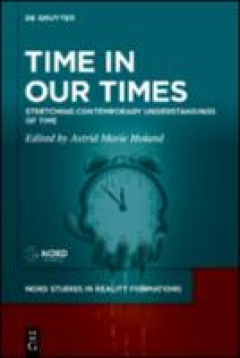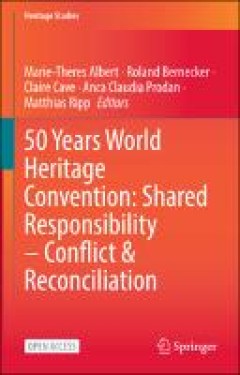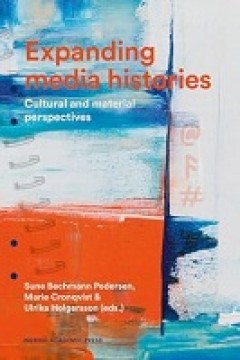Ditapis dengan
E-book Complexity and Dynamics
How did people organize their settlements in prehistory? This question is at the core of a large number of archaeological excavations throughout Scandinavia and beyond, and has remained so during the past three to four centuries. A few decades after the introduction and implementation of settlement archaeological excavations based on top-soil m…
- Edisi
- -
- ISBN/ISSN
- 9789464270440
- Deskripsi Fisik
- 226 hlm
- Judul Seri
- -
- No. Panggil
- 930.1 CHR c

E-book Time in Our Times: Stretching Contemporary Understandings of Time
What is happening to perceptions of time, durability and reality in the 21th century? This anthology explores a diversity of uncommon insights about time, as seen from our historical and geographical standpoint. It sheds new light on how construction, perception and regulation of time influences a person’s whole being in the world, collectively and individually, in the short and long run, fro…
- Edisi
- -
- ISBN/ISSN
- 9783111428970
- Deskripsi Fisik
- 357 halaman
- Judul Seri
- -
- No. Panggil
- 115 HOL t

E-book History of Yugoslavia
Why did Yugoslavia fall apart? Was its violent demise inevitable? Did its population simply fall victim to the lure of nationalism? How did this multinational state survive for so long, and where do we situate the short life of Yugoslavia in the long history of Europe in the twentieth century? The Complete History of Yugoslavia by Marie-Janine Calic provides a concise, accessible, comprehensive…
- Edisi
- -
- ISBN/ISSN
- 9781557538499
- Deskripsi Fisik
- 443 halaman
- Judul Seri
- -
- No. Panggil
- 949.7 CAL h

E-book Eyewitness Companions : Film
History, genres, world cinemas, A-Z of directors, top 100 movies.
- Edisi
- -
- ISBN/ISSN
- 9780670915736
- Deskripsi Fisik
- 516 halaman, ilus.
- Judul Seri
- -
- No. Panggil
- 778.2 BER e
E-book Under Construction : Performing Critical Identity
At the turn of the 2020s, identity seems to remain an omnipresent and somewhatunseizable term, serving different views in and outside academia, in politics,in everyday talk, in intellectual and popular jargon, as well as in the arts. While,currently, identitarian ideologies and essentialist notions of identity that tend tosimplify and reduce life experience to simple factors globally …
- Edisi
- -
- ISBN/ISSN
- 9783038975007
- Deskripsi Fisik
- 230 hlm
- Judul Seri
- -
- No. Panggil
- 700 KOH u
E-book Sexual Violence and Restorative Justice : Addressing the Justice Gap
Sexual violence1 in all its forms, whether intra- familial, within institutions, an-onymous, or during conflicts, although frequent and widespread as can be seen in all the media reports, is a crime for which anecdotal accounts and scholarly reports seem to suggest that the victims in their great majority do not receive redress. It is a crime with high levels of attrition (Kelly, Lov…
- Edisi
- -
- ISBN/ISSN
- 9780198858638
- Deskripsi Fisik
- 417 hlm
- Judul Seri
- -
- No. Panggil
- 345 KEE s
E-book Decriminalising Abortion in the UK : What Would It Mean?
When people talk about the ‘abortion question’, what they generally mean is something like this: how should we balance the protection of unborn human life against the rights and interests of a pregnant woman to control her own body? Possibly, they also have in mind a further important (but analytically distinct) issue: how should law (criminal or otherwi…
- Edisi
- -
- ISBN/ISSN
- 9781447354024
- Deskripsi Fisik
- 176 hlm
- Judul Seri
- -
- No. Panggil
- 363.46 FOX d
E-book All Things Arabia : Arabian Identity and Material Culture
n a suggestive passage, Wilfred Thesiger, or, as his Arab friends affectionately called him, Mubarak bin London, described his encounter with the people of the Empty Quarter in the following terms:“The northern Arabs had no traditions of civiliza-tion behind them. To arrange three stones as a fireplace on which to set a pot was the only archi-tecture that many …
- Edisi
- -
- ISBN/ISSN
- 9789004435926
- Deskripsi Fisik
- 286 hlm
- Judul Seri
- -
- No. Panggil
- 939.4 BAI a
E-book Building Industries at Sea - ‘Blue Growth’ and the New Maritime Ec…
For thousands of years the oceans have been highly prized and have providedus with efficient transport and a plentiful supply of food. Therefore, it seemsobvious that our modern society should continue to use the oceans andmaximize the benefits. There might be great treasures of valuable materials,new bio-compounds and endless energy. However society is reluctant tochange an…
- Edisi
- -
- ISBN/ISSN
- 9788793609266
- Deskripsi Fisik
- 515 hlm
- Judul Seri
- -
- No. Panggil
- 621.042 ROB b
E-book Circulation and Control : Artistic Culture and Intellectual Property i…
The nineteenth century witnessed a series of revolutions in the production, circulation, and reproduction of images. Thanks to changes in printing and imaging technology and shifts in the practices of artists, publishers, and photographers, images became more readily available, in a wider range of media than ever before. Working in the new field of lithography,…
- Edisi
- -
- ISBN/ISSN
- 9781800641488
- Deskripsi Fisik
- 545 hlm
- Judul Seri
- -
- No. Panggil
- 346.04 ALE c
E-book Records of Disaster : Media Infrastructures and Climate Change
In recent years, the emergent field of critical infrastructure studies has turned to interdisciplinary analysis of infrastruc-tures as complex worldmaking systems: They produce shared space and time, connect cultures and subjectivities, negotiate power relations, inequalities, or the mediation and circulation of material agency.1 Infrastructures often appear as networks of media technologies th…
- Edisi
- -
- ISBN/ISSN
- 9783957962096
- Deskripsi Fisik
- 167 hlm
- Judul Seri
- -
- No. Panggil
- 320.12 BEC r

E-book Dark Botany: The Herbarium Tales
Dark Botany activates the material and sensorial wonder of plants—their energy, their mysterious allure, their capacities and skills, their independent might. In this Wunderkammer of critical plant studies essays and plant+artworks, the herbarium emerges as a site of multiple materialities and reflexive forms of counter-narrative. Herbaria specimens come alive as assemblages, telling truths a…
- Edisi
- -
- ISBN/ISSN
- 9781785421365
- Deskripsi Fisik
- 334 halaman
- Judul Seri
- -
- No. Panggil
- 580 GIB d
E-book Women in the History of Science : A Sourcebook
We are inspired by and support UCL’s programme to liberate the curriculum alongside other programmes with similar aims. Women are too often excluded in the history of science, and this book aims to recover the voices, works and experiences of women in the production of knowledge through primary sources. This book offers university lecturers and tutors a diverse range of …
- Edisi
- -
- ISBN/ISSN
- 9781800084155
- Deskripsi Fisik
- 476 hlm
- Judul Seri
- -
- No. Panggil
- 902 ABR w
E-book Accessibilité et offre active : Santé et services sociaux en context…
ous êtes-vous déjà imaginé devoir communiquer avec un méde-cin ou un autre professionnel de la santé et des services sociaux dans une langue que vous ne parlez pas ou que vous ne parlez qu’occasionnellement ? Ceci est pourtant la réalité de plusieurs fran-cophones vivant dans les communautés francophones en situation linguistique minoritaire (CFSM). Il arrive, en effet, …
- Edisi
- -
- ISBN/ISSN
- 9782760325609
- Deskripsi Fisik
- 432 hlm
- Judul Seri
- -
- No. Panggil
- 306.4444 DRO a

E-Book 50 Years World Heritage Convention: Shared Responsibility – Conflict…
This open access book identifies various forms of heritage destruction and analyses their causes. It proposes strategies for avoiding and solving conflicts, based on integrating heritage into the 2030 Agenda for Sustainable Development. It reflects on the identity-building role of heritage, on multidimensional conflicts and the destruction of heritage, and considers conflict-solving strategies …
- Edisi
- -
- ISBN/ISSN
- 9783031056604
- Deskripsi Fisik
- 2022
- Judul Seri
- -
- No. Panggil
- 306.4 ALB f

E-Book Expanding Media Histories: Cultural and Material Perspectives
Contemporary media history is a rapidly growing field that extends far beyond traditional studies of technology or institutions such as radio, film, and television. This volume expands the scope further still to analyse ephemeral, mundane phenomena long overlooked by media historiography. In eight original essays, the volume demonstrates the strengths of a broad concept of the media. The first …
- Edisi
- -
- ISBN/ISSN
- 9789189361676
- Deskripsi Fisik
- 256 halaman
- Judul Seri
- -
- No. Panggil
- 302.2 PED e
The Life-Changing Magic of Tidying Up
Walaupun sudah susah payah merapikan rumah, apakah kertas-kertas terus saja bertumpuk dan pakaian harus terus anda jejalkan di lemari? Kenapa kita tidak bisa menjaga kerapian rumah? Marie Kondo memperkenalkan metode merapikan yang ampuh tiada duanya, KonMari. Keampuhan metode yang kini semakin marak diterapkan di Jepang dan telah dikemas dalam program televisi laris, "Tidy Up With KonMari!" in…
- Edisi
- Cet. 2
- ISBN/ISSN
- 9786231860682
- Deskripsi Fisik
- xviii, 214 hlm; 13 x 20,5 cm
- Judul Seri
- -
- No. Panggil
- 128 KON t
E-book Taking Offense : Religion, Art, and Visual Culture in Plural Configura…
In this era of digital multiplicity, images are reproduced atdazzling speed and spread instantly across the globe, yet they trigger vastly different responses. Images are not sim-ply depictions; they become visible to beholders in the con-text of embodied, habitual practices of looking, display,and figuration — a visual regime. In pluralistic settingscharacterized by cultural and religious di…
- Edisi
- -
- ISBN/ISSN
- 9783846763452
- Deskripsi Fisik
- 383 hlm
- Judul Seri
- -
- No. Panggil
- 111.85 KRU t
E-book Philosophy of Astrophysics : Stars, Simulations, and the Struggle to D…
The volume you have before you is the first edited collection specifically devoted to philosophy of astrophysics. Our primary aims in producing this volume have been to gather contemporary research in philosophy of astrophysics together in one place as both a reference resource for scholars already working in this subdiscipline and as an introduc…
- Edisi
- -
- ISBN/ISSN
- 9783031266188
- Deskripsi Fisik
- 330 hlm
- Judul Seri
- -
- No. Panggil
- 523.01 MAT p
E-book War Remains : Mediations of Suffering and Death in the Era of the Worl…
What remains with us after somebody’s death? In a poem from 1966, the Swedish poet and future Nobel laureate Tomas Tranströmer reflected on the ‘long, shimmering comet tail’ that the shock leaves behind, and which ‘keeps us inside’. Death has a comet tail, a tenden-cy to remain with us, sometimes for a very long time. Tranströmer also uses references to different media—the televis…
- Edisi
- -
- ISBN/ISSN
- 9789188661012
- Deskripsi Fisik
- 221 hlm
- Judul Seri
- -
- No. Panggil
- 809 CRO w
E-book Myths and legends of the sioux
Once upon a time a prairie mouse busied herself all fall storing away a cache of beans. Every morning she was out early with her empty cast-off snake skin, which she filled with ground beans and dragged home with her teeth. The little mouse had a cousin who was fond of dancing and talk, but who did not like to work. She was not careful to get her cache of beans and the season was already …
- Edisi
- -
- ISBN/ISSN
- -
- Deskripsi Fisik
- 184 hlm; 0.3 mb
- Judul Seri
- -
- No. Panggil
- 823 MCL m

BAGI HASIL DI HINDIA BELANDA
- Edisi
- cet. 1
- ISBN/ISSN
- -
- Deskripsi Fisik
- xxxi; 467 hlm;14,5 x 21 cm
- Judul Seri
- -
- No. Panggil
- 959 SCH b
- Edisi
- cet. 1
- ISBN/ISSN
- -
- Deskripsi Fisik
- xxxi; 467 hlm;14,5 x 21 cm
- Judul Seri
- -
- No. Panggil
- 959 SCH b
 Karya Umum
Karya Umum  Filsafat
Filsafat  Agama
Agama  Ilmu-ilmu Sosial
Ilmu-ilmu Sosial  Bahasa
Bahasa  Ilmu-ilmu Murni
Ilmu-ilmu Murni  Ilmu-ilmu Terapan
Ilmu-ilmu Terapan  Kesenian, Hiburan, dan Olahraga
Kesenian, Hiburan, dan Olahraga  Kesusastraan
Kesusastraan  Geografi dan Sejarah
Geografi dan Sejarah